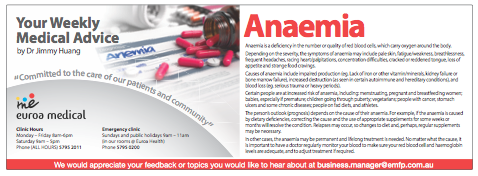Anaemia is a deficiency in the number or quality of red blood cells, which carry oxygen around the body. Depending on the severity, the symptoms of anaemia may include pale skin, fatigue/weakness, breathlessness, frequent headaches, racing heart/palpitations, concentration difficulties, cracked or reddened tongue, loss of appetite and strange food cravings.
Causes of anaemia include impaired production (eg. Lack of iron or other vitamin/minerals, kidney failure or bone marrow failure), increased destruction (as seen in certain autoimmune and hereditary conditions), and blood loss (eg. serious trauma or heavy periods).
Certain people are at increased risk of anaemia, including: menstruating, pregnant and breastfeeding women; babies, especially if premature; children going through puberty; vegetarians; people with cancer, stomach ulcers and some chronic diseases; people on fad diets, and athletes.
The person’s outlook (prognosis) depends on the cause of their anaemia. For example, if the anaemia is caused by dietary deficiencies, correcting the cause and the use of appropriate supplements for some weeks or months will resolve the condition. Relapses may occur, so changes to diet and, perhaps, regular supplements may be necessary.
In other cases, the anaemia may be permanent and lifelong treatment is needed. No matter what the cause, it is important to have a doctor regularly monitor your blood to make sure your red blood cell and haemoglobin levels are adequate, and to adjust treatment if required.
Written by Dr Jimmy Huang


